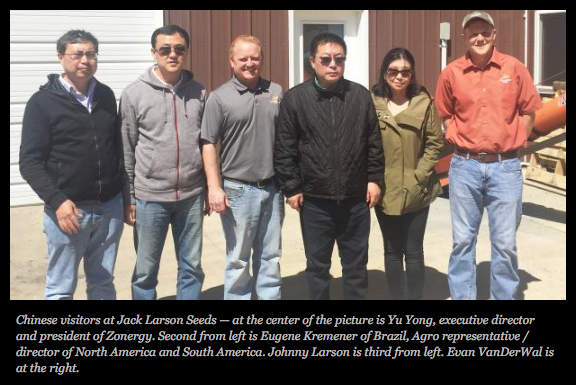
Chinese entrepreneurs recently spent a day in our community learning about American agriculture.
The delegation representing Zonergy, a Chinese energy conglomerate, visited Jack Larson Seeds to learn more about seed treatment and tour the facilities — hoping to build similar facilities in Beijing.
Zonergy Company Limit-ed is a national high-tech enterprise that focuses on “sustainable development,” and devotes itself to joining effectively different valuable sections in the fields of new energy, energy saving and emission reduction, and agriculture.
Seed treatments can achieve exceptionally high efficiencies in terms of effective dose-transfer to a crop. Pesticides and fungicides are applied to the seed prior to planting in the form of a seed treatment, or coating, to protect against soil-borne risks to the plant. That’s standard in the corn industry. Additionally, these coatings can provide supplemental chemicals and nutrients designed to encourage growth.
Jack Larson Seeds is leading the testing of an Agro product (GMX) Greenamax, a seed treatment for all kinds of plants. “Basically, it’s a direct fertilizer that goes on the seed,” said Johnny Larson, who with his father, Jack, own and operate Jack Larson Seeds. “The Chinese came here to learn how it could be used — concentrating their efforts on corn and soybeans. They want to replicate what we are now doing.”
Jack Larson Seeds, located north of Springfield and near Clements, was selected to demonstrate the technology and their expertise in the application process. Larson Seeds is the only company doing this testing in North America.
“We tested last year,” said Dallas Schwandt of Eden Prairie, president of Lyndale Plant Services, whose connection with Agro brought the Chinese here. That testing was done on the Schwandt family farm near Sanborn. The product Greenamax is certified organic and is being used on vegetable crops and green house plantings and they see a lot of good results with that, Schwandt noted. Now they want to apply it to agricultural products.
“Dallas tried some of the GMX last year on his farm and it showed very, very good results,” said Larson. “That piqued the interest of some large companies that saw the data. We made the connection with the Chinese market.”
In the second year of trials, Larson Seeds will test the GMX product on 300-600 acres with several growers in Brown, Redwood and Cottonwood counties. “We will spread out the testing to make sure that it wasn’t just a one-hit wonder as it seemed to be on his (Schwandt) farm last year,” Larson said.
Larson and employee Evan VanDerWal will monitor the plantings throughout the season. “We put them all into a program so we can keep an eye on them” explained Larson. “We’ll walk out into the fields and check them — personally scout them. We’ll also have some satellite imagery to keep an eye on them.”
Harvest will determine its success. “We will look at the variables throughout the growing season — the visual growing benefits such as healthy plant and strong root system. That usually correlates with the entire yield. If it looks good throughout the growing season we should have a positive yield result.” “It all comes down to the harvest,” Larson said. The grain will be evaluated for yield and other important agronomic characteristics. “We look at test weight, bushels per acre and everything,” Larson said. “If the bushels don’t add up to make it a more profitable product, then it’s not going to be a success.”
“We’re testing products all the time. The GMX product really caught my eye. It’s easy to use and easy to handle,” Larson said. “There are more ways of applying other than seed treatment. We are going to try with a couple of different applications. We’ll try it with seed treating, which we did last week, and we’ll try it with over-the-top foliar spraying as well with the same product. It’s a multi-use product.”
The Chinese visitors spent several hours at Jack Larson Seeds on May 4. They also went to the Schwandt farm near Sanborn and talked with Lonnie Jensen, who does the custom farming there, and watched some actual seed planting.
The Chinese want to get into commercial seed treating. “Right now they are treating seeds and letting it air dry on blankets or the floor; that is very time consuming,” Larson said. “We can treat as many soybeans in 10 minutes as they can treat in a week.”
The Chinese were amazed at the American technology. “It was fun to see their reactions when we showed them around and explained the various technology,” Larson said.
“The best part of their visit for me was to hear about the differences in agriculture… and to know how good we have it here in agriculture.”
